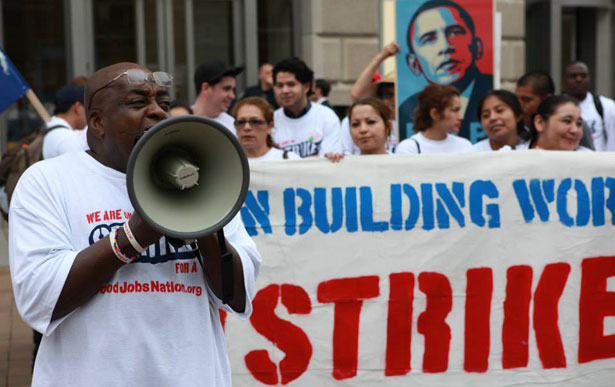
Strikers from the Ronald Reagan Building. (Credit: GoodJobsNation.org)
Organizers tell The Nation that four food court outlets in a federal building initially refused to let employees return to work following a Tuesday strike, but relented following protests by supporters.
The four establishments—Subway, Bassett’s Original Turkey, Quick Pita and Kabuki Sushi—are located in the Ronald Reagan federal building, one of several Washington, DC, workplaces where employees with taxpayer-supported jobs went on strike as part of the Good Jobs Nation campaign, whose backers include the Service Employees International Union. As The Nation reported Tuesday, the strikers are demanding that President Obama take executive action to improve labor standards for workers who are employed by private companies to do jobs backed by public spending. According to organizers, the one-day strike involved hundreds of workers, and forced about half of the Reagan Building’s food court outlets to shut down at some point during the day. (The Reagan Building is owned by the federal government; many of its food outlets are franchisees of restaurant or fast food chains.)
Bassett’s employee Suyapa Moreno told The Nation in Spanish that three of her outlet’s four staff went on strike Tuesday, and that when they showed up to start their shift on Wednesday, “The owner told my co-worker she was fired. So I said, ‘If you’re going to fire her, I’m not coming back to work.’” She said her manager told them that “she didn’t want to see us again.” Moreno said she believes her co-worker was targeted because management saw her as the ringleader who convinced Moreno and a third Bassett’s worker to strike.
Moreno said the workers then waited at the food court until other workers, organizers and community supporters gathered to protest the terminations. According to the Good Jobs Nation campaign, about a hundred total supporters converged in the food court to protest ten total terminations by four outlets. Once there was a big enough group, said Moreno, “We went back to talk to the owner, and she accepted us back.” The Good Jobs Nation campaign told The Nation that managers or owners from Subway, Quick Pita and Kabuki Sushi also agreed to reverse the terminations once confronted by crowds of supporters.
The federal Office of Management and Budget did not respond to a request for comment Thursday afternoon regarding the allegations, or to The Nation’s prior inquiries this week regarding the Good Jobs Nation campaign. An employee who answered the phone at the Reagan Building Bassett’s Original Turkey location early Thursday evening said that no manager was on the property to comment. A call to the building’s Kabuki Sushi location went unanswered. The person who answered the phone at the building’s Subway location said he was too busy to comment; the Subway corporation did not immediately respond to an inquiry.
Reached on the Reagan Building Quick Pita location’s phone line, a person who identified himself as a manager there said that no strikers had been denied the chance to return to work, and charged that the campaign was making workers “victims for a bigger political agenda.” He declined to give his name, and said that he was not authorized to speak for the Quick Pita company or the franchisee’s owner.
The attempted terminations alleged by Good Jobs Nation could be violations of federal labor law. As I’ve noted previously, the law generally prohibits “firing” workers for striking, but often allows “permanently replacing” strikers by filling their positions during the strike and refusing to reinstate them. But strikes that the government finds to be motivated in part by prior labor law violations, as Good Jobs Nation says Tuesday’s was, receive greater legal protection; and striking for only one day may also provide a shield against “permanent replacement.”
However, labor advocates and activists have long charged that the National Labor Relations Board’s slow process and weak penalties do little to discourage companies from firing activists. In order to deter retaliation, organizers of recent fast food strikes have arranged for delegations of supporters, sometimes including local politicians and clergy, to accompany the strikers back to work the next day. As I reported for Salon in November, activists say that an indoor occupation and outdoor picket of a Wendy’s store led management to reverse the termination of one of the participants in New York’s first fast food strike. Organizers say the same approach worked yesterday in Washington.
“Before, when workers were treated badly or fired unjustly, nothing would happen,” said Moreno. “And so the bosses felt like they could keep doing it.” Following the strike and yesterday’s showdown, she said, “Now they treat us with a little more respect, because they’re afraid that if they keep doing what they’re doing, more of this will happen.”
Will “subcontracted” Missouri mineworkers get a fair deal? Read Laura Flanders’s report.


